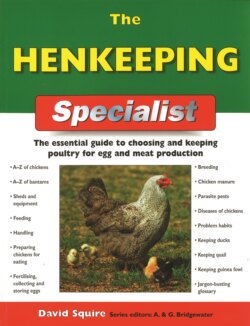Читать книгу The Henkeeping Specialist - David Squire - Страница 11
На сайте Литреса книга снята с продажи.
CHICKEN CHECKLIST
ОглавлениеCosts and results – is it worth it?
Do not expect to make a fortune out of keeping your own chickens or even to save a great deal of money on shopping bills – but you will be assured about the source of the eggs, their freshness, the foods which produced them and that the chickens have led a contented life. Eggs are one of the cleanest possible foods, the shell protecting the contents from dirt and germs.
Optimum number of chickens
Six hens will keep a family in eggs throughout the year. If you have a cock bird with them, this is about the number of hens that he can manage.
Eggs or meat?
Most backyard chicken enthusiasts keep hens solely for the eggs they produce. A list of the best egg-layers is given on page 8. Chickens that are raised for both meat and eggs are also listed on page 8.
Laying life of a hen
Pure-bred breeds can live for up to ten years (depending on the breed); this is much longer than hybrids, which often die before they reach five years of age. Most breeds start to lay eggs when 18–22 weeks old, but remember that the number of eggs decreases as a hen ages. Finally, it becomes uneconomic to keep her. Most hens will have reached the end of their economic life by the age of five.
Are chickens noisy?
Unless you have a cock bird in with your chickens (and it is not necessary to do this if all you want to do is to produce eggs), the noise level is not obtrusive. They will, however, make a fuss if alarmed and under attack. Also, some hens make a noise after laying an egg.
Can I keep just one chicken?
You can, but chickens are social creatures and need company. If you have just one chicken, it will be lonely and look to you to provide its social life! Keeping 3–6 chickens is about right to cater for their social activities.
Cock birds (roosters) are invariably noisy – but they are not essential for the production of eggs.
Rules and regulations
Keeping chickens on your land or allotment is surprisingly straightforward:
First, check with the deeds of your property to ensure that you are legally able to keep chickens.
Provided you have fewer than 50 chickens, there is no need to register them with any authority. Keeping more than 50 chickens is considered to be a commercial venture and must be registered with the authorities in your country.
Consult with your local authority to check if there is a bye-law preventing anyone in your area from keeping chickens on their own property.
Talk with your neighbours to see if they are in agreement with you keeping chickens; this is mainly a matter of getting their goodwill and to prevent disagreements arising later. Inviting them around to inspect your chickens and their housing usually settles any problems – especially if they are offered a few eggs!
